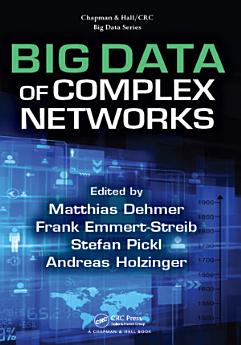Big Data of Complex Networks
Matthias Dehmer · Frank Emmert-Streib · Stefan Pickl · Andreas Holzinger
Aug 2016 · CRC Press
Ebook
332
Pages
family_home
Eligible
info
reportRatings and reviews aren’t verified Learn More
About this ebook
Big Data of Complex Networks presents and explains the methods from the study of big data that can be used in analysing massive structural data sets, including both very large networks and sets of graphs. As well as applying statistical analysis techniques like sampling and bootstrapping in an interdisciplinary manner to produce novel techniques for analyzing massive amounts of data, this book also explores the possibilities offered by the special aspects such as computer memory in investigating large sets of complex networks. Provides a complete discussion of both the hardware and software used to organize big data Describes a wide range of useful applications for managing big data and resultant data sets Maintains a firm focus on massive data and large networks Unveils innovative techniques to help readers handle big data
Intended for computer scientists, statisticians and mathematicians interested in the big data and networks, Big Data of Complex Networks is also a valuable tool for researchers in the fields of visualization, data analysis, computer vision and bioinformatics.
Key features:
Matthias Dehmer
received his PhD in computer science from the Darmstadt University of Technology, Germany. Currently, he is Professor at UMIT – The Health and Life Sciences University, Austria, and the Universität der Bundeswehr München. His research interests are in graph theory, data science, complex networks, complexity, statistics and information theory.Frank Emmert-Streib
received his PhD in theoretical physics from the University of Bremen, and is currently Associate professor at Tampere University of Technology, Finland. His research interests are in the field of computational biology, machine learning and network medicine.Stefan Pickl
holds a PhD in mathematics from the Darmstadt University of Technology, and is currently a Professor at Bundeswehr Universität München. His research interests are in operations research, systems biology, graph theory and discrete optimization.Andreas Holzinger
received his PhD in cognitive science from Graz University and his habilitation (second PhD) in computer science from Graz University of Technology. He is head of the Holzinger Group HCI-KDD at the Medical University Graz and Visiting Professor for Machine Learning in Health Informatics Vienna University of Technology.About the author
Matthias Dehmer
studied mathematics at the University of Siegen (Germany) and received his PhD in computer science from the Technical University of Darmstadt (Germany). Afterwards, he was a research fellow at Vienna BioCenter (Austria), Vienna University of Technology, and University of Coimbra (Coimbra). He obtained his habilitation in applied discrete mathematics from the Vienna University of Technology. Currently, he is Professor at UMIT – The Health and Life Sciences University (Austria) and also holds a position at the Universit ̈at der Bundeswehr M ̈unchen. His research interests are in applied mathematics, bioinformatics, systems biology, graph theory, complexity, and information theory. He has written over 175 publications in his research areas.Frank Emmert-Streib
studied physics at the University of Siegen, Germany, gaining his PhD in theoretical physics from the University of Bremen. He was a postdoctoral research associate at the Stowers Institute for Medical Research, Kansas City, USA, and a senior fellow at the University of Washington, Seattle, USA. Currently, he is a lecturer/assistant professor at the Queen’s University Belfast, UK, at the Center for Cancer Research and Cell Biology, heading the Computational Biology and Machine Learning Lab. His research interests are in the field of computational biology, machine learning, and biostatistics in the development and application of methods from statistics and machine learning for the analysis of high-throughput data from genomics and genetics experiments.Rate this ebook
Tell us what you think.
Reading information
Smartphones and tablets
Install the Google Play Books app for Android and iPad/iPhone. It syncs automatically with your account and allows you to read online or offline wherever you are.
Laptops and computers
You can listen to audiobooks purchased on Google Play using your computer's web browser.
eReaders and other devices
To read on e-ink devices like Kobo eReaders, you'll need to download a file and transfer it to your device. Follow the detailed Help Center instructions to transfer the files to supported eReaders.








